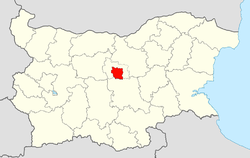Gabrovo Municipality
Gabrovo Municipality
Община Габрово | |
|---|---|
Municipality | |
 Gabrovo Municipality within Bulgaria and Gabrovo Province. | |
| Coordinates: 42°53′N 25°17′E / 42.883°N 25.283°ECoordinates: 42°53′N 25°17′E / 42.883°N 25.283°E | |
| Country | |
| Province (Oblast) | Gabrovo |
| Admin. centre (Obshtinski tsentar) | Gabrovo |
| Area | |
| • Total | 555.57 km2 (214.51 sq mi) |
| Population (December 2018)[1] | |
| • Total | 57,625 |
| • Density | 100/km2 (270/sq mi) |
| Time zone | UTC+2 (EET) |
| • Summer (DST) | UTC+3 (EEST) |
Gabrovo Municipality (Bulgarian: Община Габрово) is a municipality (obshtina) in Gabrovo Province, North-central Bulgaria, located on the northern slopes of the central Stara planina mountain to the area of the so-called Fore-Balkan. It is named after its administrative centre - the city of Gabrovo which is also the capital of the province.
The municipality embraces a territory of 555.57 km² with a population of 67,501 inhabitants, as of December 2009.[1]
Aside from the rich cultural landmarks of the main city, the area is best known with the beautifully preserved architectural reserve of Bozhentsi village and the north approach to Shipka Pass which was a noted place of the Bulgarian history and one of the main transport connections between the north and south parts of Bulgaria and the Balkan peninsula.
Settlements[]
(towns are shown in bold):
| Town/Village | Cyrillic | Population[2][3][4] (December 2009) |
|---|
|
|
|
Demography[]
The following table shows the change of the population during the last four decades.
| Gabrovo Municipality | ||||||||
|---|---|---|---|---|---|---|---|---|
| Year | 1975 | 1985 | 1992 | 2001 | 2005 | 2007 | 2009 | 2011 |
| Population | 85,932 | 90,032 | 84,333 | 74,949 | 70,537 | 69,248 | 67,501 | ... |
| Sources: Census 2001,[5] Census 2011,[6] „pop-stat.mashke.org“,[7] | ||||||||
Religion[]
According to the latest Bulgarian census of 2011, the religious composition, among those who answered the optional question on religious identification, was the following:
See also[]
- Provinces of Bulgaria
- Municipalities of Bulgaria
- List of cities and towns in Bulgaria
References[]
- ^ Jump up to: a b (in English) Bulgarian National Statistical Institute - Bulgarian provinces and municipalities in 2009 Archived November 13, 2010, at the Wayback Machine
- ^ (in English) Bulgarian National Statistical Institute - Bulgarian towns in 2009 Archived November 13, 2010, at the Wayback Machine
- ^ (in English) Bulgarian National Statistical Institute - Bulgarian villages under 1000 inhabitants - December 2009
- ^ (in English) Bulgarian National Statistical Institute - Bulgarian Settlements 1000-5000 inhabitants - December 2009
- ^ National Statistical Institute - Census 2001
- ^ „pop-stat.mashke.org“
- ^ "Population of Bulgarian divisions". Pop-stat.mashke.org. 2011-02-01. Retrieved 2012-03-28.
- ^ "Religious composition of Bulgaria 2011". pop-stat.mashke.org.
External links[]
- Official website (in Bulgarian)
- Municipalities in Gabrovo Province

